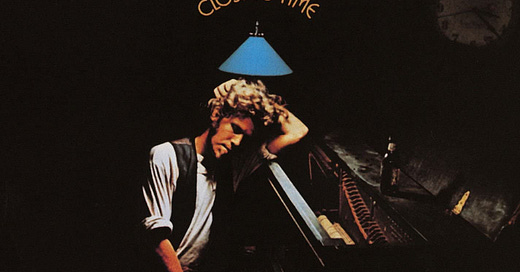I usually avoid leading into an entry on The Run Out Grooves with the opening line of a closing track; I’m much happier with another non-chorus line. We don’t have a choice with Tom Waits’ ‘Closing Time’1 from his debut album of the same name, which has just celebrated a fiftieth birthday. After Waits cues us in with these words, there are no more words. The song is the first of many instrumentals in his career - the sheer number of which is an interesting choice for a singer with such a recognisable voice.
These wordless compositions allow him to explore different musical styles, arrangements, and emotions, showcasing his versatility as a composer and musician and displaying his influences from genres like jazz, blues, and experimental music; waits adapts these elements to create his unique style, further enriching his work. Instrumentals also play a significant role in enhancing the storytelling and atmosphere of Waits' albums. They provide a change of pace and variety, contrasting with his vocal tracks and creating a more immersive listening experience. What I find telling, though, is the parallel track his instrumental works take with his vocalised songs.
Closing Time introduced the world to Waits’ unique Los Angeles barfly persona. The album blends mid-career Frank Sinatra's jazzy, sorrowful intrigue and the gritty vulgarity of countercultural street poets like Kerouac and Bukowski. It is a chronicle of Waits' tales of drunken mishaps and heartaches. At 23, Waits painted late-night barroom soundscapes with piano-centred compositions, offering introspective narratives that would evolve into a raw, bluesy howl in his post-Nighthawks at the Diner work.
Producer Jerry Yester told Barney Hoskyns in his 2009 book Lowside Of The Road: A Life Of Tom Waits;
That was absolutely the most magical session I've ever been involved with. at the end of it, no one spoke for what felt like five minutes, either in the booth or out in the room. No one budged. Nobody wanted the moment to end.
Recorded almost as an afterthought for Closing Time, it was cut on a Sunday at Western Recorders, ‘Closing Time’ blended Waits' plangent piano chords with Tony Terran's wistful trumpet the warm cello lines of Jesse Erlich. Unable to locate (bass player) Bill Plummer, Yester had to rely on somebody's recommendation of Arni Egilsson, who tore himself away from a barbecue, threw his double bass in the car, and made it to the session just in time.
The piece conveys melancholy and nostalgia, wordlessly encapsulating the album's themes and motifs. The arrangement evokes a late-night bar or dimly lit, fuggy smoke-filled lounge, capturing the feeling of weary patrons leaving the establishment as the evening draws to a close - or the morning is starting.
As Waits' career progressed, his sound evolved from the relaxed feel of Closing Time to more experimental and atmospheric work. His debut album is a snapshot of a young Waits exploring his artistic terrain, laying the groundwork for developing his larger-than-life persona in later works. Throughout the next fifty years, Waits composed around 50 instrumentals,2 of which, much like his songwriting progression from bar-stool folk-jazz to experimental rock, you can trace a progression in style. Compare the type of wooziness manifested in 2002’s ‘Calliope’ to ‘Closing Time’, and you can see how the lack of lyrical content didn’t prevent the ability to compose instrumentals that convey strong emotions as well as paint vivid scenes in the listener's mind.
Not to be confused with Semisonic’s song of the same name, which opens their second album, Feeling Strangely Fine, despite the title being as much about openings as it is about closings “Every new beginning comes from some other beginning’s end”.
Not in the way Sufjan Stevens pretended he would be able to write a whole album about Iowa.





Apologies to anyone who ended up with two similar emails - I was attempting to upload this copy to my Substack, ironically for posterity, and despite not wishing to, it defaulted to emailing. So sorry about that!
Great guest post Mitchell, and as the White Stripes once observed, "said it once before but it bears repeating now!"
This is a great instrumental track, an amazingly mature bit of music for a 23yo!